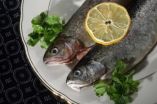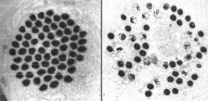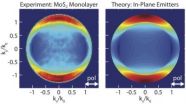(Press-News.org) Jena (Germany) Fish is healthy: easy to digest and with a high level of precious proteins, fish is considered an important part of a healthy diet. And with the so-called omega-3 fatty acids fish contains real 'fountains of youth'. These fatty acids – like docosahexaeonic acid (DHA) occur mostly in fatty fish like herring, salmon and mackerel. They are thought to lower the blood pressure, to strengthen the immune system and to have positive effects on the development on the nervous system and the cardiovascular system.
"Clinical studies about the intake of nutritional supplements containing omega-3 fatty acids haven't provided complete clarity so far," Prof. Dr. Stefan H. Heinemann from Friedrich Schiller University Jena (Germany) says. "The molecular impact of the omega-3 fatty acids isn't fully understood yet," the biophysicist continues. But now scientists of the DFG research group FOR 1738 based at Jena University are able to bring new facts to light: in two newly published articles for the well-known science magazine 'Proceedings of the National Academy of Sciences, USA' they describe how they analyzed the impact of omega-3 fatty acids on a systemic level and they also described the underlying molecular mechanisms for the first time.
The teams around Prof. Heinemann (Jena University), Prof. Dr. Michael Bauer (Jena University Hospital) and Prof. Dr. Toshinori Hoshi (University of Pennsylvania) were able to show that the so-called 'SLO1' potassium channel is an important component in the effectiveness of omega-3 fatty acids. "These ionic channels act like very specific receptors for DHA and are opened by the binding of the omega-3 fatty acids," Biophysicist Heinemann explains. In the case of other omega-3 fatty acids – like the shorter eicosapentaenoic acid (EPA) or the alpha-linolenic acid (ALA) extracted from plants – the impact is much weaker.
Prof. Bauer and his colleagues examined the effects of omega-3 fatty acids on SLO1 channels of the cardiovascular system by experimenting with mice. "Administration of DHA should result in an expansion of the blood vessels and consequently a drop in blood pressure," the physician says. The laboratory experiments confirmed exactly that. In genetically modified mice however, which were not able to produce the SLO1 channel, the antihypertensive impact of DHA failed to appear. "Thus we were able to show for the first time that DHA directly influences the blood pressure, which is being mediated through SLO1 channels," Bauer summarizes.
Beyond that, the scientists made another surprising discovery: a variant of DHA, which can often be found in nutritional supplements containing omega-3 fatty acids, doesn't show an antihypertensive effect. Moreover, it suppresses and even diminishes the effect of the natural DHA from fish oil. "The intake of non-natural omega-3 fatty acids can therefore also have counter-productive effects," Prof. Bauer stresses. This is of particular importance for the nutritional supplements of patients in intensive care who are being drip-fed: their supplements of omega-3 fatty acids should be specifically aimed at and adapted to the patients' clinical requirements.
INFORMATION:
Original Publications:
Hoshi, T., B. Wissuwa, T. Tian, N. Tajima, R. Xu, M. Bauer, S.H. Heinemann, S. Hou (2013) Omega-3 fatty acids lower blood pressure by directly activating large-conductance Ca2+-dependent K+ channels. Proceedings of the National Academy of Sciences USA (DOI: 10.1073/pnas.1221997110)
Hoshi, T., T. Tian, R. Xu, S.H. Heinemann, S. Hou (2013) Mechanism of the modulation of BK potassium channel complexes with different auxiliary subunit compositions by the omega-3 fatty acid DHA. Proceedings of the National Academy of Sciences USA (DOI: 10.1073/pnas.1222003110)
Contact:
Prof. Dr. Stefan H. Heinemann
Institute for Biochemistry and Biophysics
Center for Molecular Biomedicine (CMB)
Friedrich Schiller University Jena and Jena University Hospital
Hans-Knöll-Str. 2
D-07745 Jena
Germany
Phone: ++49 3641 / 9395650, Email: stefan.h.heinemann@uni-jena.de
Prof. Dr. Michael Bauer
Department of Anesthesiology and Intensive Care Medicine
Center for Sepsis Control and Care (CSCC), Jena University Hospital
Erlanger Allee 101
D-07747 Jena
Germany
Phone: ++49 3641 / 9323110, Email: michael.bauer@med.uni-jena.de
Why fish is so good for you
Scientists of Friedrich Schiller University Jena and Jena University Hospital decode the antihypertensive impact of omega-3 fatty acids
2013-03-05
ELSE PRESS RELEASES FROM THIS DATE:
Does the villainous 'selfish' gene undermine genome's police?
2013-03-05
PROVIDENCE, R.I. [Brown University] — For a bunch of inanimate chemical compounds, the nucleic and amino acids caught up in the infamous "selfish" segregation distorter (SD) saga have put on quite a soap opera for biologists since the phenomenon was discovered in fruit flies 50 years ago. A new study, a highlight in the March issue of the journal Genetics, provides the latest plot twist.
In TV listings the series would be described this way: "A gene exploits a rival gene's excesses, sabotaging any sperm that bear the rival's chromosome." The listing is not an exaggeration ...
Colonoscopy screening reduces risk of advanced colorectal cancer
2013-03-05
Philadelphia - A new study led by a researcher at the Perelman School of Medicine at the University of Pennsylvania adds support to current medical recommendations stating that screening colonoscopy substantially reduces an average-risk adult’s likelihood of being diagnosed with advanced colorectal cancer (CRC) in either the right or left side of the colon. In recent years, colonoscopy has begun to rapidly replace sigmoidoscopy – a procedure used to detect abnormalities in the rectum and left side of the colon – despite initially limited evidence of its efficacy and higher ...
New spectroscopy method could lead to better optical devices
2013-03-05
PROVIDENCE, R.I. [Brown University] — A multi-university research team has used a new spectroscopic method to gain a key insight into how light is emitted from layered nanomaterials and other thin films.
The technique, called energy-momentum spectroscopy, enables researchers to look at the light emerging from a thin film and determine whether it is coming from emitters oriented along the plane of the film or from emitters oriented perpendicular to the film. Knowing the orientations of emitters could help engineers make better use of thin-film materials in optical devices ...
Shadows over data sharing
2013-03-05
In a paper about to be published in EPJ Data Science, Barbara Jasny, deputy editor for commentary at Science magazine in Washington, DC, USA, looks at the history of the debates surrounding data access during and after the human genome "war". In this context, she outlines current challenges in accessing information affecting research, particularly with regard to the social sciences, personalised medicine and sustainability.
The trouble is that most researchers do not currently share their data. This is due both to research practices and research culture. Scientists withholding ...
Herbal defluoridation of drinking water
2013-03-05
Researchers in India have developed a filter system based on a medicinal herb, which they say can quickly and easily remove "fluoride" from drinking water. The technology described in the March issue of the International Journal of Environmental Engineering uses parts of the plant Tridax procumbens as a biocarbon filter for the ion.
Drinking water can contain natural fluoride or fluoride might be added as a protective agent for teeth by water companies. However, its presence is not without controversy while in some natural drinking water levels may be above those considered ...
Kirk, Spock together: Putting emotion, logic into computational words
2013-03-05
Kirk and Spock may not need a Vulcan mind meld to share cognition: Virginia Tech Carilion Research Institute scientists have found that our cold reasoning and hot feelings may be more intimately connected than previously thought.
"We tend to believe we have rational parts, like Spock, and separate emotional parts, like Kirk. But our research suggests that's not true," said Read Montague, director of the Human Neuroimaging Laboratory at the Virginia Tech Carilion Research Institute, who led the study. "We're all a combination of logical Spock and intuitive Kirk. Cold ...
When good food goes bad
2013-03-05
MARCH 5, 2013—Baltimore, MD—The Center for Biosecurity of UPMC today released online ahead of print a new report, When Good Food Goes Bad: Strengthening the US Response to Foodborne Disease Outbreaks. The authors analyzed existing data and studies on foodborne illness outbreak response, identified emerging trends, and interviewed dozens of federal and state-level officials and experts from industry, professional organizations, academia, and relevant international organizations. The report puts forth a series of recommendations to accelerate and strengthen responses to foodborne ...
Nurse migration in North and Central America strengthening health systems
2013-03-05
International nurse migration is a multibillion-dollar global phenomenon. Historically, Mexicans and Central Americans have not played a significant part in the migration of nurses to the United States. A new report, Strengthening health systems in North and Central America: What role for migration?, sponsored by the Migration Policy Institute (MPI), seeks to draw attention to the cross-border migration in the Americas and suggests ways the migration could be managed to meet the demand for health care services in the region.
The report, co-authored by New York University ...
Gravitational lens creates cartoon of space invader
2013-03-05
The gravitational field surrounding this massive cluster of galaxies, Abell 68, acts as a natural lens in space to brighten and magnify the light coming from very distant background galaxies.
Like a fun house mirror, lensing creates a fantasy landscape of arc-like images and mirror images of background galaxies. The foreground cluster is 2 billion light-years away, and the lensed images come from galaxies far behind it.
In this photo, the image of a spiral galaxy at upper left has been stretched and mirrored into a shape similar to that of a simulated alien from the ...
EARTH: Releasing a flood of controversy on the Colorado River
2013-03-05
Alexandria, VA – As the Colorado River winds through the Colorado Plateau's soft sedimentary strata, it picks up a tremendous amount of sediment. This sediment – which once left the river's waters so muddy that Spanish explorers christened it El Rio Colorado "the reddish river" – is a vital component to the unique ecosystems of the river. However, with the construction of the Hoover and Glen Canyon dams, which trap the sediment, the once-turbid waters have become a dazzling blue-green, signaling major changes with serious implications for the health of the river's native ...
LAST 30 PRESS RELEASES:
Four NYU faculty win Sloan Foundation research fellowships
Personal perception of body movement changes when using robotic prosthetics
Study shows brain responses to wildlife images can forecast online engagement — and could help conservation messaging
Extreme heat and drought at flowering could put future wheat harvests at risk
Harlequin ichthyosis: a comprehensive review of pathogenesis, diagnosis, and management
Smithsonian planetary scientists discover recent tectonic activity on the Moon
Government censorship of Chinese chatbots
Incorporating a robotic leg into one’s body image
Brain imaging reveals how wildlife photos open donor wallets
Wiley to expand Advanced Portfolio
Invisible battery parts finally seen with pioneering technique
Tropical forests generate rainfall worth billions, study finds
A yeast enzyme helps human cells overcome mitochondrial defects
Bacteria frozen in ancient underground ice cave found to be resistant against 10 modern antibiotics
Rhododendron-derived drugs now made by bacteria
Admissions for child maltreatment decreased during first phase of COVID-19 pandemic, but ICU admissions increased later
Power in motion: transforming energy harvesting with gyroscopes
Ketamine high NOT related to treatment success for people with alcohol problems, study finds
1 in 6 Medicare beneficiaries depend on telehealth for key medical care
Maps can encourage home radon testing in the right settings
Exploring the link between hearing loss and cognitive decline
Machine learning tool can predict serious transplant complications months earlier
Prevalence of over-the-counter and prescription medication use in the US
US child mental health care need, unmet needs, and difficulty accessing services
Incidental rotator cuff abnormalities on magnetic resonance imaging
Sensing local fibers in pancreatic tumors, cancer cells ‘choose’ to either grow or tolerate treatment
Barriers to mental health care leave many children behind, new data cautions
Cancer and inflammation: immunologic interplay, translational advances, and clinical strategies
Bioactive polyphenolic compounds and in vitro anti-degenerative property-based pharmacological propensities of some promising germplasms of Amaranthus hypochondriacus L.
AI-powered companionship: PolyU interfaculty scholar harnesses music and empathetic speech in robots to combat loneliness
[Press-News.org] Why fish is so good for youScientists of Friedrich Schiller University Jena and Jena University Hospital decode the antihypertensive impact of omega-3 fatty acids



